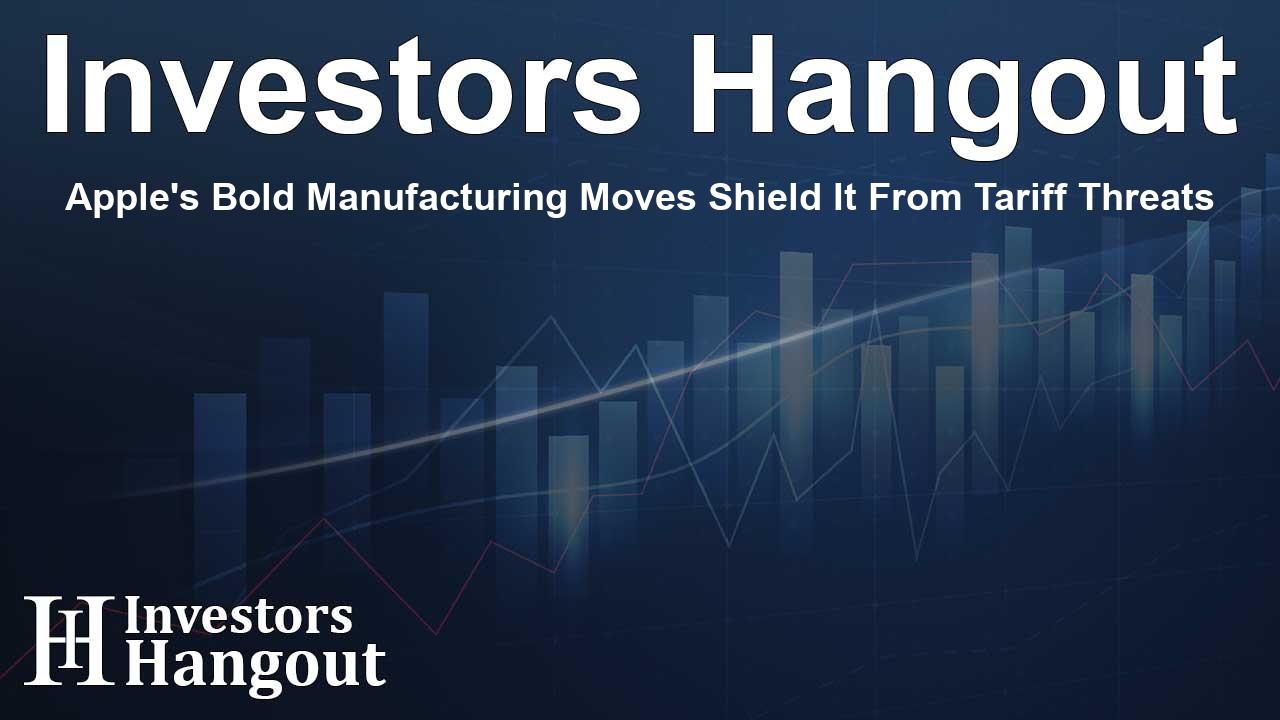Apple's Bold Manufacturing Moves Shield It From Tariff Threats

Apple's Bold Manufacturing Moves Shield It From Tariff Threats
Apple's proactive stance in U.S. manufacturing has taken center stage following a significant announcement from CEO Tim Cook. The company has committed to a staggering $100 billion investment aimed at enhancing its operational footprint in the U.S. This declaration coincides with announcements regarding tariff policies that could impact the semiconductor industry. Apple's decision is strategically timed, suggesting a clear intention to navigate potential trade obstacles effectively.
Strategic Investment Amid Tariff Concerns
The timing of Apple's investment is critical as the U.S. government considers imposing hefty tariffs on imported semiconductors, a move that has raised concerns across the tech industry.
Due to the expected tariffs impacting nearly every company, the focus has shifted to those manufacturers with strong domestic commitments. Apple’s hefty investment not only remains a significant statement aimed at averting these tariffs but also provides vital security for its operations during prime sales periods. While it anticipates a loss of approximately $1.1 billion this quarter due to tariffs, these measures could shield Apple from even more substantial losses during crucial product launches, especially with the impending introduction of new iPhone models.
Apple's new American Manufacturing Program (AMP) expands its existing U.S. supply chain, collaborating with key industry players like Corning, Texas Instruments, Samsung, and Taiwan Semiconductor Manufacturing. The aim is to establish a comprehensive silicon supply chain within U.S. borders, which could see partners produce over 19 billion chips for Apple products by 2025. This approach also includes plans to hire around 20,000 individuals in the U.S., focusing on research and development, silicon engineering, and intelligence advancements.
The Economic Ramifications of 100% Semiconductor Tariffs
The notion of imposing 100% tariffs on imported semiconductors has significant implications not just for Apple but for the entire tech industry. Such aggressive trade measures could lead to vast repercussions for nations reliant on U.S. chip exports. Industry leaders have already expressed their dismay, indicating that such tariffs would be devastating for their economies.
While South Korea's Samsung and SK Hynix have managed to secure favorable treatment under existing trading agreements, other firms, particularly in China, face strict repercussions. This environment fosters a competitive tech landscape, intensifying the ongoing U.S.-China technology race.
The global semiconductor landscape's intricate nature means that chips frequently traverse borders for production. This proposal could force companies to reassess their global operational strategies, leaning heavily towards domestic manufacturing, thereby reshaping the entire supply chain architecture.
Apple's Financial Meridian and Market Sentiment
The stock performance of Apple (NASDAQ: AAPL) has also reflected robust market confidence. After announcing its manufacturing commitments, the stock saw an uptick, illustrating investors' positive perception towards Apple's strategic positioning. Despite facing various challenges, including a notable year-to-date decline compared to the broader market averages, Apple's resilience is manifested in its significant market capitalization of approximately $3.16 trillion.
With forward-looking metrics indicating a premium valuation, Apple's capacity to sustain investor confidence hinges on its constant innovation and growth. As such, market analysts maintain a cautiously optimistic outlook on AAPL, taking into account price predictions ranging widely. The tariff exemption can potentially alleviate short-term hardship, yet persistent challenges relevant to AI and tech advancements remain a critical focus for Apple moving forward.
Apple continues to hold a formidable financial position, currently boasting $55.37 billion in cash reserves along with a strong free cash flow of nearly $94.87 billion. This financial muscle equips Apple with the necessary resources to pivot during unpredictable trade climates while simultaneously investing in strategic growth initiatives.
Frequently Asked Questions
What is Apple’s manufacturing investment amount?
Apple has committed to a $100 billion investment aimed at increasing its manufacturing operations in the U.S.
How do the tariffs affect Apple's operations?
The tariffs could initially cost Apple about $1.1 billion this quarter, but their U.S. manufacturing commitment may provide crucial protection.
What are the economic impacts of the proposed tariffs?
The proposed tariffs could dramatically affect countries reliant on U.S. chip exports, potentially leading to higher consumer prices and reduced competition.
How has Apple’s stock reacted to these developments?
Apple's stock surged by 3.12% following the announcement of its manufacturing commitments and tariff exemption news.
What future challenges does Apple face?
While Apple enjoys a solid financial position, it needs to address concerns surrounding its AI capabilities and maintain its innovation pipeline to secure its market leadership.
About The Author
Contact Lucas Young privately here. Or send an email with ATTN: Lucas Young as the subject to contact@investorshangout.com.
About Investors Hangout
Investors Hangout is a leading online stock forum for financial discussion and learning, offering a wide range of free tools and resources. It draws in traders of all levels, who exchange market knowledge, investigate trading tactics, and keep an eye on industry developments in real time. Featuring financial articles, stock message boards, quotes, charts, company profiles, and live news updates. Through cooperative learning and a wealth of informational resources, it helps users from novices creating their first portfolios to experts honing their techniques. Join Investors Hangout today: https://investorshangout.com/
The content of this article is based on factual, publicly available information and does not represent legal, financial, or investment advice. Investors Hangout does not offer financial advice, and the author is not a licensed financial advisor. Consult a qualified advisor before making any financial or investment decisions based on this article. This article should not be considered advice to purchase, sell, or hold any securities or other investments. If any of the material provided here is inaccurate, please contact us for corrections.
